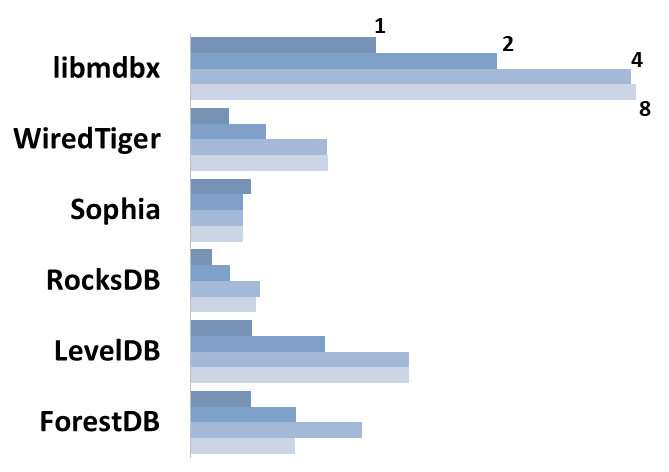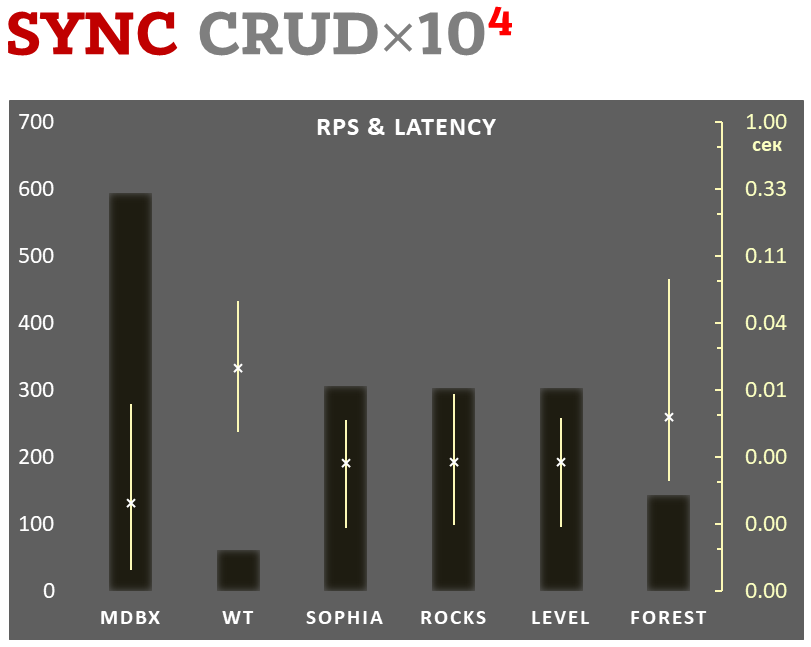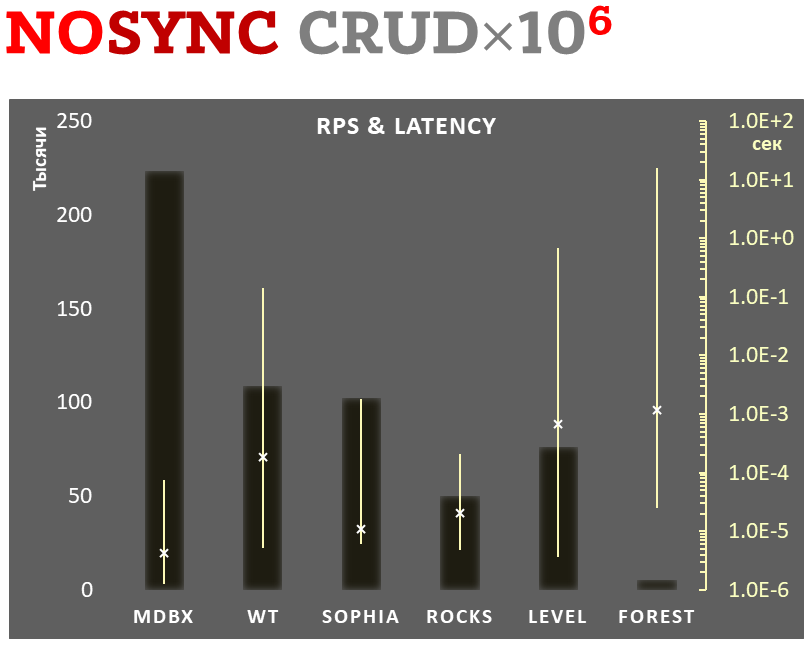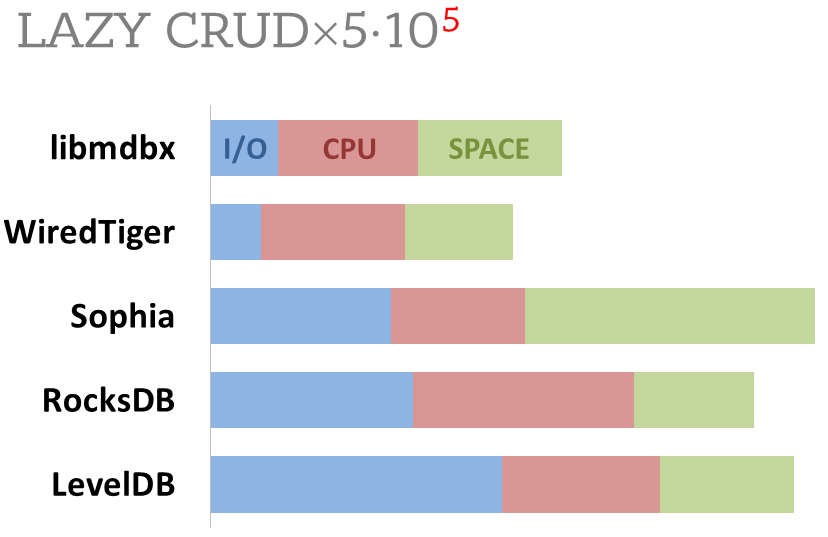diff options
| author | George Hazan <ghazan@miranda.im> | 2020-07-08 17:05:52 +0300 |
|---|---|---|
| committer | George Hazan <ghazan@miranda.im> | 2020-07-08 17:05:52 +0300 |
| commit | f365c11384642f6674ff5019ff97eda6f89ba378 (patch) | |
| tree | cd5940e703567e2d0dcc5f20d8a6d9afee6bfbe8 /libs/libmdbx/src/README.md | |
| parent | e5ee9bdc7089073f7b3fe6bfdb1cec594e912ca8 (diff) | |
fixes #2475 (Update libmdbx to 0.8.2)
Diffstat (limited to 'libs/libmdbx/src/README.md')
| -rw-r--r-- | libs/libmdbx/src/README.md | 110 |
1 files changed, 54 insertions, 56 deletions
diff --git a/libs/libmdbx/src/README.md b/libs/libmdbx/src/README.md index 6f02ab467d..2191c563fa 100644 --- a/libs/libmdbx/src/README.md +++ b/libs/libmdbx/src/README.md @@ -9,10 +9,10 @@ database, with [permissive license](LICENSE). _MDBX_ has a specific set of properties and capabilities, focused on creating unique lightweight solutions with extraordinary performance. -1. Allows **swarm of multi-threaded processes to +1. Allows **a swarm of multi-threaded processes to [ACID]((https://en.wikipedia.org/wiki/ACID))ly read and update** several key-value [maps](https://en.wikipedia.org/wiki/Associative_array) and -[multimaps](https://en.wikipedia.org/wiki/Multimap) in a localy-shared +[multimaps](https://en.wikipedia.org/wiki/Multimap) in a locally-shared database. 2. Provides **extraordinary performance**, minimal overhead through @@ -20,11 +20,11 @@ database. `Olog(N)` operations costs by virtue of [B+ tree](https://en.wikipedia.org/wiki/B%2B_tree). -3. Requires **no maintenance and no crash recovery** since doesn't use +3. Requires **no maintenance and no crash recovery** since it doesn't use [WAL](https://en.wikipedia.org/wiki/Write-ahead_logging), but that might be a caveat for write-intensive workloads with durability requirements. -4. **Compact and friendly for fully embeddeding**. Only 25KLOC of `C11`, +4. **Compact and friendly for fully embedding**. Only 25KLOC of `C11`, 64K x86 binary code, no internal threads neither processes, but implements a simplified variant of the [Berkeley DB](https://en.wikipedia.org/wiki/Berkeley_DB) and @@ -44,20 +44,20 @@ neglected in favour of write performance. OpenSolaris, OpenIndiana, NetBSD, OpenBSD and other systems compliant with **POSIX.1-2008**. -Historically, _MDBX_ is deeply revised and extended descendant of amazing +Historically, _MDBX_ is a deeply revised and extended descendant of the amazing [Lightning Memory-Mapped Database](https://en.wikipedia.org/wiki/Lightning_Memory-Mapped_Database). -_MDBX_ inherits all benefits from _LMDB_, but resolves some issues and adds set of improvements. +_MDBX_ inherits all benefits from _LMDB_, but resolves some issues and adds [a set of improvements](#improvements-beyond-lmdb). The next version is under active non-public development from scratch and will be released as **_MithrilDB_** and `libmithrildb` for libraries & packages. Admittedly mythical [Mithril](https://en.wikipedia.org/wiki/Mithril) is resembling silver but being stronger and lighter than steel. Therefore -_MithrilDB_ is rightly relevant name. +_MithrilDB_ is a rightly relevant name. > _MithrilDB_ will be radically different from _libmdbx_ by the new > database format and API based on C++17, as well as the [Apache 2.0 > License](https://www.apache.org/licenses/LICENSE-2.0). The goal of this > revolution is to provide a clearer and robust API, add more features and - > new valuable properties of database. + > new valuable properties of the database. [](https://t.me/libmdbx) [](https://travis-ci.org/erthink/libmdbx) @@ -112,13 +112,13 @@ and [CoW](https://en.wikipedia.org/wiki/Copy-on-write). - Transactions for readers and writers, ones do not block others. -- Writes are strongly serialized. No transactions conflicts nor deadlocks. +- Writes are strongly serialized. No transaction conflicts nor deadlocks. - Readers are [non-blocking](https://en.wikipedia.org/wiki/Non-blocking_algorithm), notwithstanding [snapshot isolation](https://en.wikipedia.org/wiki/Snapshot_isolation). - Nested write transactions. -- Reads scales linearly across CPUs. +- Reads scale linearly across CPUs. - Continuous zero-overhead database compactification. @@ -153,7 +153,7 @@ transaction journal. No crash recovery needed. No maintenance is required. 2. MDBX is based on [B+ tree](https://en.wikipedia.org/wiki/B%2B_tree), so access to database pages is mostly random. Thus SSDs provide a significant performance boost over spinning disks for large databases. -3. MDBX uses [shadow paging](https://en.wikipedia.org/wiki/Shadow_paging) instead of [WAL](https://en.wikipedia.org/wiki/Write-ahead_logging). Thus syncing data to disk might be bottleneck for write intensive workload. +3. MDBX uses [shadow paging](https://en.wikipedia.org/wiki/Shadow_paging) instead of [WAL](https://en.wikipedia.org/wiki/Write-ahead_logging). Thus syncing data to disk might be a bottleneck for write intensive workload. 4. MDBX uses [copy-on-write](https://en.wikipedia.org/wiki/Copy-on-write) for [snapshot isolation](https://en.wikipedia.org/wiki/Snapshot_isolation) during updates, but read transactions prevents recycling an old retired/freed pages, since it read ones. Thus altering of data during a parallel long-lived read operation will increase the process work set, may exhaust entire free database space, @@ -161,9 +161,9 @@ the database can grow quickly, and result in performance degradation. Try to avoid long running read transactions. 5. MDBX is extraordinarily fast and provides minimal overhead for data access, -so you should reconsider about use brute force techniques and double check your code. +so you should reconsider using brute force techniques and double check your code. On the one hand, in the case of MDBX, a simple linear search may be more profitable than complex indexes. -On the other hand, if you make something suboptimally, you can notice a detrimentally only on sufficiently large data. +On the other hand, if you make something suboptimally, you can notice detrimentally only on sufficiently large data. ### Comparison with other databases For now please refer to [chapter of "BoltDB comparison with other @@ -189,13 +189,13 @@ the user's point of view. 2. Up to 20% faster than _LMDB_ in [CRUD](https://en.wikipedia.org/wiki/Create,_read,_update_and_delete) benchmarks. > Benchmarks of the in-[tmpfs](https://en.wikipedia.org/wiki/Tmpfs) scenarios, - > that tests the speed of engine itself, shown that _libmdbx_ 10-20% faster than _LMDB_. - > These and other results could be easily reproduced with [ioArena](https://github.com/pmwkaa/ioarena) just by `make bench-quartet`, + > that tests the speed of the engine itself, showned that _libmdbx_ 10-20% faster than _LMDB_. + > These and other results could be easily reproduced with [ioArena](https://github.com/pmwkaa/ioarena) just by `make bench-quartet` command, > including comparisons with [RockDB](https://en.wikipedia.org/wiki/RocksDB) > and [WiredTiger](https://en.wikipedia.org/wiki/WiredTiger). 3. Automatic on-the-fly database size adjustment, both increment and reduction. - > _libmdbx_ manage the database size according to parameters specified + > _libmdbx_ manages the database size according to parameters specified > by `mdbx_env_set_geometry()` function, > ones include the growth step and the truncation threshold. > @@ -204,19 +204,19 @@ the user's point of view. 4. Automatic continuous zero-overhead database compactification. > During each commit _libmdbx_ merges suitable freeing pages into unallocated area - > at the end of file, and then truncate unused space when a lot enough of. + > at the end of file, and then truncates unused space when a lot enough of. 5. The same database format for 32- and 64-bit builds. > _libmdbx_ database format depends only on the [endianness](https://en.wikipedia.org/wiki/Endianness) but not on the [bitness](https://en.wiktionary.org/wiki/bitness). 6. LIFO policy for Garbage Collection recycling. This can significantly increase write performance due write-back disk cache up to several times in a best case scenario. - > LIFO means that for reuse will be taken latest became unused pages. + > LIFO means that for reuse will be taken the latest becames unused pages. > Therefore the loop of database pages circulation becomes as short as possible. > In other words, the set of pages, that are (over)written in memory and on disk during a series of write transactions, will be as small as possible. > Thus creates ideal conditions for the battery-backed or flash-backed disk cache efficiency. 7. Fast estimation of range query result volume, i.e. how many items can -be found between a `KEY1` and a `KEY2`. This is prerequisite for build +be found between a `KEY1` and a `KEY2`. This is a prerequisite for build and/or optimize query execution plans. > _libmdbx_ performs a rough estimate based on common B-tree pages of the paths from root to corresponding keys. @@ -228,7 +228,7 @@ and/or optimize query execution plans. 11. Callback for lack-of-space condition of database that allows you to control and/or resolve such situations. -12. Support for opening database in the exclusive mode, including on a network share. +12. Support for opening databases in the exclusive mode, including on a network share. ### Added Abilities: @@ -245,14 +245,14 @@ pair, to the first, to the last, or not set to anything. > for a write transaction, reading lag and holdover space for read transactions. 5. Extended update and delete operations. - > _libmdbx_ allows ones _at once_ with getting previous value + > _libmdbx_ allows one _at once_ with getting previous value > and addressing the particular item from multi-value with the same key. ### Other fixes and specifics: -1. Fixed more than 10 significant errors, in particular: page leaks, wrong sub-database statistics, segfault in several conditions, unoptimal page merge strategy, updating an existing record with a change in data size (including for multimap), etc. +1. Fixed more than 10 significant errors, in particular: page leaks, wrong sub-database statistics, segfault in several conditions, nonoptimal page merge strategy, updating an existing record with a change in data size (including for multimap), etc. -2. All cursors can be reused and should be closed explicitly, regardless ones were opened within write or read transaction. +2. All cursors can be reused and should be closed explicitly, regardless ones were opened within a write or read transaction. 3. Opening database handles are spared from race conditions and pre-opening is not needed. @@ -262,15 +262,15 @@ pre-opening is not needed. 5. Guarantee of database integrity even in asynchronous unordered write-to-disk mode. > _libmdbx_ propose additional trade-off by implementing append-like manner for updates > in `MDBX_SAFE_NOSYNC` and `MDBX_WRITEMAP|MDBX_MAPASYNC` modes, that avoid database corruption after a system crash - > contrary to LMDB. Nevertheless, the `MDBX_UTTERLY_NOSYNC` mode available to match LMDB behaviour, - > and for a special use-cases. + > contrary to LMDB. Nevertheless, the `MDBX_UTTERLY_NOSYNC` mode is available to match LMDB behaviour, + > and for special use-cases. 6. On **MacOS & iOS** the `fcntl(F_FULLFSYNC)` syscall is used _by default_ to synchronize data with the disk, as this is [the only way to guarantee data durability](https://developer.apple.com/library/archive/documentation/System/Conceptual/ManPages_iPhoneOS/man2/fsync.2.html) in case of power failure. Unfortunately, in scenarios with high write -intensity, the use of `F_FULLFSYNC` significant degrades performance +intensity, the use of `F_FULLFSYNC` significantly degrades performance compared to LMDB, where the `fsync()` syscall is used. Therefore, _libmdbx_ allows you to override this behavior by defining the `MDBX_OSX_SPEED_INSTEADOF_DURABILITY=1` option while build the library. @@ -279,13 +279,13 @@ _libmdbx_ allows you to override this behavior by defining the it allows place the database on network drives, and provides protection against incompetent user actions (aka [poka-yoke](https://en.wikipedia.org/wiki/Poka-yoke)). Therefore -_libmdbx_ may be a little lag in performance tests from LMDB where a +_libmdbx_ may be a little lag in performance tests from LMDB where the named mutexes are used. ### History At first the development was carried out within the [ReOpenLDAP](https://github.com/erthink/ReOpenLDAP) project. About a -year later _libmdbx_ was separated into standalone project, which was +year later _libmdbx_ was separated into a standalone project, which was [presented at Highload++ 2015 conference](http://www.highload.ru/2015/abstracts/1831.html). @@ -297,7 +297,7 @@ Howard Chu <hyc@openldap.org> is the author of LMDB, from which originated the MDBX in 2015. Martin Hedenfalk <martin@bzero.se> is the author of `btree.c` code, which -was used for begin development of LMDB. +was used to begin development of LMDB. -------------------------------------------------------------------------------- @@ -309,7 +309,7 @@ Usage _libmdbx_ provides two official ways for integration in source code form: 1. Using the amalgamated source code. - > The amalgamated source code includes all files requires to build and + > The amalgamated source code includes all files required to build and > use _libmdbx_, but not for testing _libmdbx_ itself. 2. Adding the complete original source code as a `git submodule`. @@ -319,7 +319,7 @@ _libmdbx_ provides two official ways for integration in source code form: **_Please, avoid using any other techniques._** Otherwise, at least don't ask for support and don't name such chimeras `libmdbx`. -The amalgamated source code could be created from original clone of git +The amalgamated source code could be created from the original clone of git repository on Linux by executing `make dist`. As a result, the desired set of files will be formed in the `dist` subdirectory. @@ -335,7 +335,7 @@ are completely traditional and have minimal prerequirements like target platform. Obviously you need building tools itself, i.e. `git`, `cmake` or GNU `make` with `bash`. -So just use CMake or GNU Make in your habitual manner and feel free to +So just using CMake or GNU Make in your habitual manner and feel free to fill an issue or make pull request in the case something will be unexpected or broken down. @@ -367,7 +367,7 @@ where there are no similar bugs in the pthreads implementation. ### Linux and other platforms with GNU Make To build the library it is enough to execute `make all` in the directory -of source code, and `make check` for execute the basic tests. +of source code, and `make check` to execute the basic tests. If the `make` installed on the system is not GNU Make, there will be a lot of errors from make when trying to build. In this case, perhaps you @@ -380,14 +380,14 @@ Make is called by the gmake command or may be missing. In addition, You need to install the required components: GNU Make, bash, C and C++ compilers compatible with GCC or CLANG. After that, to build the -library, it is enough execute `gmake all` (or `make all`) in the +library, it is enough to execute `gmake all` (or `make all`) in the directory with source code, and `gmake check` (or `make check`) to run the basic tests. ### Windows For build _libmdbx_ on Windows the _original_ CMake and [Microsoft Visual Studio 2019](https://en.wikipedia.org/wiki/Microsoft_Visual_Studio) are -recommended. Otherwise do not forget add `ntdll.lib` to linking. +recommended. Otherwise do not forget to add `ntdll.lib` to linking. Building by MinGW, MSYS or Cygwin is potentially possible. However, these scripts are not tested and will probably require you to modify the @@ -395,15 +395,22 @@ CMakeLists.txt or Makefile respectively. It should be noted that in _libmdbx_ was efforts to resolve runtime dependencies from CRT and other libraries Visual Studio. -For this is enough define the `MDBX_AVOID_CRT` during build. +For this is enough to define the `MDBX_AVOID_CRT` during build. An example of running a basic test script can be found in the [CI-script](appveyor.yml) for [AppVeyor](https://www.appveyor.com/). To run the [long stochastic test scenario](test/long_stochastic.sh), [bash](https://en.wikipedia.org/wiki/Bash_(Unix_shell)) is required, and -the such testing is recommended with place the test data on the +such testing is recommended with placing the test data on the [RAM-disk](https://en.wikipedia.org/wiki/RAM_drive). +### Windows Subsystem for Linux +_libmdbx_ could be used in [WSL2](https://en.wikipedia.org/wiki/Windows_Subsystem_for_Linux#WSL_2) +but NOT in [WSL1](https://en.wikipedia.org/wiki/Windows_Subsystem_for_Linux#WSL_1) environment. +This is a consequence of the fundamental shortcomings of _WSL1_ and cannot be fixed. +To avoid data loss, _libmdbx_ returns the `ENOLCK` (37, "No record locks available") +error when opening the database in a _WSL1_ environment. + ### MacOS Current [native build tools](https://en.wikipedia.org/wiki/Xcode) for MacOS include GNU Make, CLANG and an outdated version of bash. @@ -427,13 +434,6 @@ To build _libmdbx_ for iOS, we recommend using CMake with the "[toolchain file](https://cmake.org/cmake/help/latest/variable/CMAKE_TOOLCHAIN_FILE.html)" from the [ios-cmake](https://github.com/leetal/ios-cmake) project. -### Windows Subsystem for Linux -_libmdbx_ could be using in [WSL2](https://en.wikipedia.org/wiki/Windows_Subsystem_for_Linux#WSL_2) -but NOT in [WSL1](https://en.wikipedia.org/wiki/Windows_Subsystem_for_Linux#WSL_1) environment. -This is a consequence of the fundamental shortcomings of _WSL1_ and cannot be fixed. -To avoid data loss, _libmdbx_ returns the `ENOLCK` (37, "No record locks available") -error when opening the database in a _WSL1_ environment. - ## API description For more information and API description see the [mdbx.h](mdbx.h) header. Please do not hesitate to point out errors in the documentation, @@ -461,7 +461,7 @@ SSD SAMSUNG MZNTD512HAGL-000L1 (DXT23L0Q) 512 Gb. Here showed sum of performance metrics in 3 benchmarks: - - Read/Search on machine with 4 logical CPU in HyperThreading mode (i.e. actually 2 physical CPU cores); + - Read/Search on the machine with 4 logical CPUs in HyperThreading mode (i.e. actually 2 physical CPU cores); - Transactions with [CRUD](https://en.wikipedia.org/wiki/CRUD) operations in sync-write mode (fdatasync is called after each @@ -486,7 +486,7 @@ Here showed sum of performance metrics in 3 benchmarks: ## Read Scalability Summary performance with concurrent read/search queries in 1-2-4-8 -threads on machine with 4 logical CPU in HyperThreading mode (i.e. actually 2 physical CPU cores). +threads on the machine with 4 logical CPUs in HyperThreading mode (i.e. actually 2 physical CPU cores).  @@ -502,12 +502,12 @@ threads on machine with 4 logical CPU in HyperThreading mode (i.e. actually 2 ph execution time, cross marks standard deviation. **10,000 transactions in sync-write mode**. In case of a crash all data -is consistent and state is right after last successful transaction. +is consistent and conforms to the last successful transaction. The [fdatasync](https://linux.die.net/man/2/fdatasync) syscall is used after each write transaction in this mode. In the benchmark each transaction contains combined CRUD operations (2 -inserts, 1 read, 1 update, 1 delete). Benchmark starts on empty database +inserts, 1 read, 1 update, 1 delete). Benchmark starts on an empty database and after full run the database contains 10,000 small key-value records.  @@ -524,15 +524,15 @@ and after full run the database contains 10,000 small key-value records. execution time, cross marks standard deviation. **100,000 transactions in lazy-write mode**. In case of a crash all data -is consistent and state is right after one of last transactions, but +is consistent and conforms to the one of last successful transactions, but transactions after it will be lost. Other DB engines use [WAL](https://en.wikipedia.org/wiki/Write-ahead_logging) or transaction -journal for that, which in turn depends on order of operations in +journal for that, which in turn depends on order of operations in the journaled filesystem. _libmdbx_ doesn't use WAL and hands I/O operations to filesystem and OS kernel (mmap). In the benchmark each transaction contains combined CRUD operations (2 -inserts, 1 read, 1 update, 1 delete). Benchmark starts on empty database +inserts, 1 read, 1 update, 1 delete). Benchmark starts on an empty database and after full run the database contains 100,000 small key-value records. @@ -550,15 +550,13 @@ records. execution time of transactions. Each interval shows minimal and maximum execution time, cross marks standard deviation. -**1,000,000 transactions in async-write mode**. In case of a crash all -data will be consistent and state will be right after one of last -transactions, but lost transaction count is much higher than in +**1,000,000 transactions in async-write mode**. In case of a crash all data is consistent and conforms to the one of last successful transactions, but lost transaction count is much higher than in lazy-write mode. All DB engines in this mode do as little writes as possible on persistent storage. _libmdbx_ uses [msync(MS_ASYNC)](https://linux.die.net/man/2/msync) in this mode. In the benchmark each transaction contains combined CRUD operations (2 -inserts, 1 read, 1 update, 1 delete). Benchmark starts on empty database +inserts, 1 read, 1 update, 1 delete). Benchmark starts on an empty database and after full run the database contains 10,000 small key-value records.  @@ -583,7 +581,7 @@ which prevents to meaningfully compare it with them. All benchmark data is gathered by [getrusage()](http://man7.org/linux/man-pages/man2/getrusage.2.html) -syscall and by scanning data directory. +syscall and by scanning the data directory.  |
